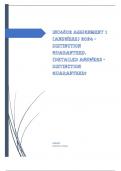ADMIN
[COMPANY NAME]
, QUESTION 1: Learning theories for inclusive teaching 30 marks 1.1 Write the
following concepts in your home language. (6) 1.1.1 Disability 1.1.2 Deafness
1.1.3 Visual impairment 1.1.4 Human rights 1.1.5 Discrimination 1.1.6
Inclusivity 1.2 Define the following concepts according to three different
authors. 1.2.1 Learning theories. (6) 1.2.2 Capability theory. (6) 1.2.3 The
theory of inclusive special education. (6) 1.2.4 Human Rights Theory. (6)
ASSIGNMENT 01 INC4802/102/0/2024 7
1.1 Concepts in my home language: 1.1.1 Disability - "Incapacidade" 1.1.2 Deafness - "Surdez"
1.1.3 Visual impairment - "Deficiência visual" 1.1.4 Human rights - "Direitos humanos" 1.1.5
Discrimination - "Discriminação" 1.1.6 Inclusivity - "Inclusividade"
1.2 Definitions according to three different authors: 1.2.1 Learning theories: - Author 1: Learning
theories are frameworks that describe how knowledge is acquired, retained, and utilized by
individuals. They encompass various perspectives and models, such as behaviorism, cognitivism,
and constructivism, to explain the learning process. - Author 2: Learning theories are conceptual
frameworks that attempt to explain how learning occurs, including the processes and
mechanisms involved in acquiring, processing, and storing information. These theories provide
insights into factors such as motivation, cognition, and social interaction that influence learning
outcomes. - Author 3: Learning theories are systematic explanations of how people learn and
develop over time. They involve understanding the cognitive, emotional, and social processes
that contribute to learning, and they inform educators' practices by providing insights into
effective teaching strategies and interventions.
1.2.2 Capability theory: - Author 1: Capability theory, proposed by Amartya Sen, emphasizes
individuals' freedom to achieve valuable functionings and capabilities. It focuses on enhancing
people's opportunities and abilities to lead lives they value, rather than merely measuring welfare
in terms of material resources or income. - Author 2: Capability theory, as articulated by Martha
Nussbaum, centers on the idea of human capabilities and flourishing. It advocates for a broad
conception of well-being that goes beyond traditional economic indicators and emphasizes the
importance of social justice, equality, and human dignity. - Author 3: Capability theory posits
that individuals' freedom to achieve their full potential and lead lives they value is paramount.
Developed by scholars like Sen and Nussbaum, this theory emphasizes the importance of
expanding people's capabilities and opportunities, particularly for marginalized groups, to
promote human development and social justice.
1.2.3 The theory of inclusive special education: - Author 1: The theory of inclusive special
education emphasizes the integration of students with diverse learning needs into mainstream
educational settings. It advocates for providing appropriate support and accommodations to
ensure all students can participate meaningfully in the learning process regardless of their
abilities or disabilities. - Author 2: The theory of inclusive special education posits that all
students, regardless of their differences, should have the opportunity to learn together in
inclusive environments. It rejects segregation and promotes practices that foster collaboration,




